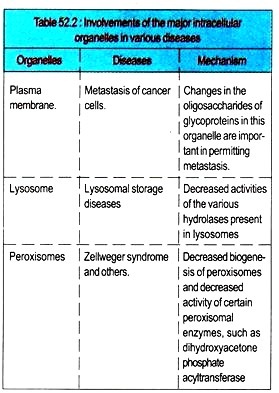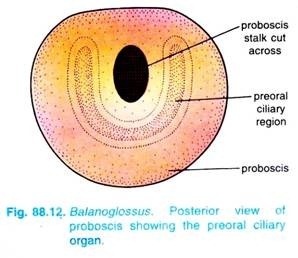The below mentioned article provides a short note on the Biochemical Basis of Diseases.
Diseases having a Biochemical Basis:
a. Life depends upon biochemical reactions.
b. Health fully depends on the regulated and harmonious functioning of many biochemical reactions and processes that occur in normal cells.
c. Diseases are caused by the alternations of structures; or the amounts of certain biomolecules; or disturbances of important biochemical reactions or processes.
d. Diseases are found as abnormalities in the structure and function of cells, organs, and systems generated by biochemical mechanisms.
e. Patients experience illnesses which reflect Psychologic, cultural, and other factors.
f. Physicians must treat the patients considering social, psychological, cultural, economic, and other factors, but always depending on a sound knowledge of biochemical, physiologic, and pathologic mechanisms.
Diseases are Considered from a Biochemical Standpoint:
a. Many diseases are determined genetically.
b. All classes of biomolecules are affected in structure and function.
Biomolecules can be affected in genetic diseases. The primary defect resides in DNA, and the structures or functions of other biomolecules are affected secondarily.
c. Biochemical changes that cause disease may occur rapidly or slowly.
(i) Some diseases progress rapidly causing death within minutes after coronary thrombosis on the fact that brain and heart particularly are very sensitive to lack of oxygen and fuel.
(ii) Life is threatened within hours at the excessive loss of water and electrolytes in cholera.
(iii) Rapid and large changes of distribution in the body of certain electrolytes (e.g., K+) become hazardous very quickly because of the sensitivity of myocardial muscles to such changes.
(iv) Extensive change of pH can be tolerated for a short time. Several years may be required for the build-up of a biomolecule to affect organ function.
d. Diseases are caused by deficiency or excess of certain biomolecules.
(i) Deficiency of Vitamin A causes night blindness; whereas excessive intake of Vitamin A results in chronic states of toxicity.
(ii) Deficiency of Vitamin D results in rickets, but excess causes severe hypercalcemia.
(iii) The general causes of nutritional secondary deficiency are the insufficient absorption, increased requirement, inadequate utilization, and increased excretion. Each of these causes occur by a number of diseases or conditions.
e. Almost every cell organelle is involved in the genesis of various diseases.
f. Different biochemical mechanisms can produce similar Pathologic, clinical, and laboratory findings.
(i) Many different bacteria and viruses can cause acute or chronic inflammation.
(ii) Hepatomegaly occurs from accumulation of glucosylceramide, but more commonly it is due to heart failure or metastases.
(iii) Fibrosis of the liver (cirrhosis) is caused by chronic intake of ethanol, excess of copper causes Wilson disease, and excess of iron causes primary hemochromatosis.
(iv) A variety of inborn errors of metabolism can lead to mental retardation, and many conditions can result in ketosis.
(v) Calcium oxalate, magnesium ammonium phosphate, uric acid, and cystine—all form renal calculi (stones), but they accumulate for different biochemical reasons.
(vi) Distinct biochemical causes can produce the same pathologic finding (e.g., cirrhosis), clinical finding (e.g., mental retardation), or laboratory finding (e.g., ketosis).
(vii) It is possible to distinguish among diseases by the history, physical examination, and suitable laboratory tests.



